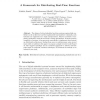Free Online Productivity Tools
i2Speak
i2Symbol
i2OCR
iTex2Img
iWeb2Print
iWeb2Shot
i2Type
iPdf2Split
iPdf2Merge
i2Bopomofo
i2Arabic
i2Style
i2Image
i2PDF
iLatex2Rtf
Sci2ools
125
click to vote
FORMATS
2008
Springer
2008
Springer
A Framework for Distributing Real-Time Functions
Abstract. The design of critical embedded real-time systems requires high confidence in the architecture and the implemented functionalities. Classically, such functions are supported on a single monoprocessor, behavior of which is completely predictable, while the execution is totally deterministic. With the growing complexity of systems, it becomes quite unavoidable to implement these systems on distributed architectures. Scaling from mono to multiprocessor raises several issues which we address in this paper: we propose a simple executive model based on time triggered paradigm and an automated approach to allocate real-time tasks based on constraint resolution techniques. We illustrate the method on an industrial case study. Key words: Distributed systems, Constraint programming, Industrial case study
Embedded Real-time Systems | Formal Methods | FORMATS 2008 | Industrial Case Study | Time Triggered Paradigm |
Related Content
| Added | 26 Oct 2010 |
| Updated | 26 Oct 2010 |
| Type | Conference |
| Year | 2008 |
| Where | FORMATS |
| Authors | Frédéric Boniol, Pierre-Emmanuel Hladik, Claire Pagetti, Frédéric Aspro, Victor Jégu |
Comments (0)

